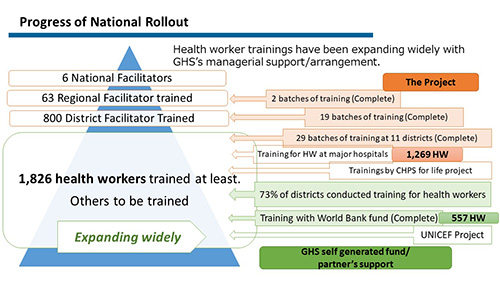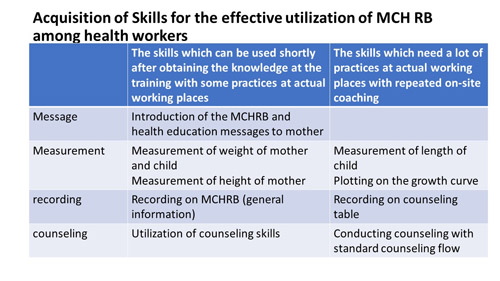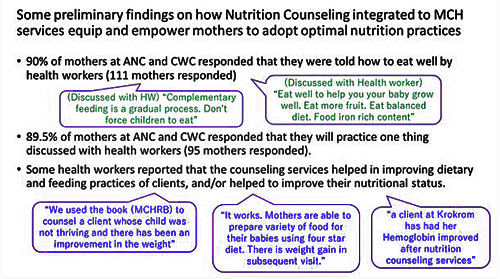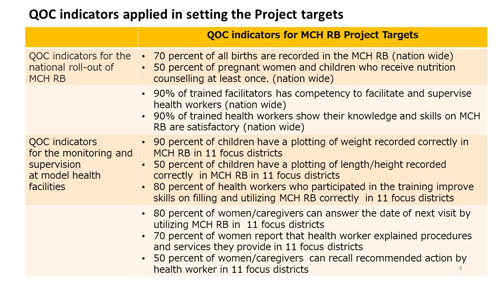- Home
- Technical Cooperation Projects
- Index of Countries
- Africa
- Ghana
- Project for Improving Continuum of Care for Mothers and Children through the introduction of Combined MCH Record Book
- Project News
- Presenting project outputs at international conferences and academic meetings
Project News
2020-12-10
Presenting project outputs at international conferences and academic meetings
The project experts participated in international conferences and academic meetings to document and disseminate implementation findings, processes for specific interventions and outcomes for the nationwide rollout of the Ghana Maternal and Child Health Record Book.
In October and November 2020, the Ghana Health Service counterpart and the project experts co-authored a total of six reports at the Annual Meeting of the Japan Society of Public Health and the Joint Congress on Global Health 2020. This was an opportunity for the project to inform the current situation in Ghana and discuss our project activities and outcomes with public health experts.
1. 79th annual meeting of Japanese Society of Public Health,
The 79th annual meeting of the Japanese Society of Public Health, October 20-22, 2020, was conducted online. The Project experts and the GHS counterparts made two presentations at the meeting.
1) Situation Analysis of MCH and Nutrition in Ashanti Region, Ghana, (1) Maternal and Child Health
A baseline assessment was conducted at 7 focus districts in Ashanti Region. 80-90% of pregnant women had MCHRB, while only 15-34% of mothers at child welfare and growth monitoring services did and less than 50% received ANC1 before 12 weeks of pregnancy. Regarding the experience and satisfaction, self-introduction by health workers to mothers was low although most mothers felt they were adequately informed about services. It was suggested that the training was needed to strengthen health workers' capacity to provide respectful care,
2) Situation Analysis of MCH and Nutrition in Ashanti Region, Ghana, (2) Nutrition
Recording of the MCHRB: especially low in newly introduced contents such as Boby Mass Index (BMI), Nutrition Counselling, and estimated desired weight range at the expected date of delivery. Diet and Feeding: the proportion of exclusive breastfeeding practice for 6 months were about 50%. 22.5% of the mothers believed that they could start giving water before 6 months. Most of the pregnant women did not consume animal source foods daily. Barrier analysis on maternal diet and child feeding: one of the key factors which made the practices easier/possible was support from family members and health workers.
There were questions about the underlying cause of the malnutrition among mothers and children may be due to food insecurity or poverty. Although it is sometimes difficult to improve nutrition due to poverty or lack of access to food, the food security situation (food availability) is relatively stable in the study area, and within this situation, pregnant and nursing mothers are not consuming animal products. The survey showed that mothers' lack of knowledge about the benefits of consuming animal products led to their non-consumption of animal products. Therefore, in our nutrition counseling, we use interactive communication to obtain information from the mothers themselves about why they have difficulty consuming animal products and what measures can be taken to enable them to do so.
2. The Joint Congress on Global Health 2020 in Osaka,
The Joint Congress on Global Health 2020 in Osaka was conducted online 1-3 November 2020 and the project experts and GHS counterparts presented 4 topics.
- National Rollout of MCH RB in Ghana
- Establishing Nutrition Counseling Services as a part of routine Maternal and Child Health services in Ghana
- Identification of Quality-of-Care Indicators for the National rollout of the MCHRB in Ghana
- Major findings of the first M&S in 11 districts focusing on the acquisition of new skills
1) National roll-out of MCH RB in Ghana
The progress of the national rollout of the MCH RB was presented with the promoting factors such as the strong ownership of the GHS and the GHS's strategy to standardize training materials of the MCH RB as a national standard and make it available for all development partners to use.
 Progress of National Rollout
Progress of National Rollout
2) Acquisition of skills for the effective utilization of MCH Record Book among health workers
The results of the first monitoring and supervision conducted in 11 focus districts in Ashanti Region in January and February 2020 were presented.
While various skills are required for effective use of the MCH handbook, it was suggested that some skills could be implemented immediately after the training and others would take time to be acquired after the training. In particular, on-site coaching after the training is important for the newly introduced child height measurement and nutritional counseling records, and for this reason, the project continues to monitor and provide on-site coaching after the training.
 Acquisition of Skills for the effective utilization of MCH RB among health workers
Acquisition of Skills for the effective utilization of MCH RB among health workers
3) Establishing Nutrition Counseling Services as a part of routine Maternal and Child Health service in Ghana
The purpose of nutrition counseling services, operational guidelines, training materials, and training methods was introduced, and the progress of nutrition counseling services was reported using the results of post-training monitoring conducted in 11 focus districts.
The organization and operation of the nutrition counseling services started smoothly, and 78% of facilities visited indicated changes in the organization of CWC and ANC to provide nutrition counseling services, including preparing a designated area for counseling. The project plans to continue coaching in the field as well as sensitizing the community members.
 Some preliminary findings on how Nutrition Counseling integrated to MCH services equip and empower mothers to adopt optimal nutrition practices
Some preliminary findings on how Nutrition Counseling integrated to MCH services equip and empower mothers to adopt optimal nutrition practices
4) Identification of Quality of Care indicators for the National rollout of the Maternal and Child Health Record Book in Ghana
The project is supporting MOH and GHS in the capacity building and institutionalization of the MCH RB for quality MCH and nutrition services. One of our key challenges is how to improve and monitor the quality of care (QOC) in a national program. The project reported the QOC indicators the project identified.
In addition to the evaluation of the technical aspects of the health workers, the knowledge and experience of the mothers are also assessed to estimate whether safe and secure care was provided effectively. The process indicators include whether the mothers remember the advice given during the counseling, whether they remember the date of their next visit, and whether they are allowed to ask questions to the health workers. The identified indicators were tested at the Monitoring and Supervision (M&S) for relevance and feasibility.
 QOC indicators applied in setting the Project targets
QOC indicators applied in setting the Project targets
Through the presentation of six abstracts, we were able to describe and disseminate the progress and concepts of how the Ghana Maternal and Child Health Record Book and the continuum of care for quality maternal and child health and nutrition are being rolled out nationwide. The reports were all prepared in collaboration with the project experts and counterparts, which allowed us to discuss and reaffirm the success factors and the value of the project activities. The project will continue to promote the nationwide rollout of the MCH RB as well as to document and disseminate the process and findings.
- About JICA
- News & Features
- Countries & Regions
- Our Work
- Thematic Issues
- Types of Assistance
- Partnerships with Other Development Partners
- Climate Change / Environmental and Social Considerations
- Evaluations
- Compliance and Anti-corruption
- Science and Technology Cooperation on Global Issues
- Research
- JICA Development Studies Program / JICA Chair
- Support for the Acceptance of Foreign HRs / Multicultural and Inclusive Community
- Publications
- Investor Relations
